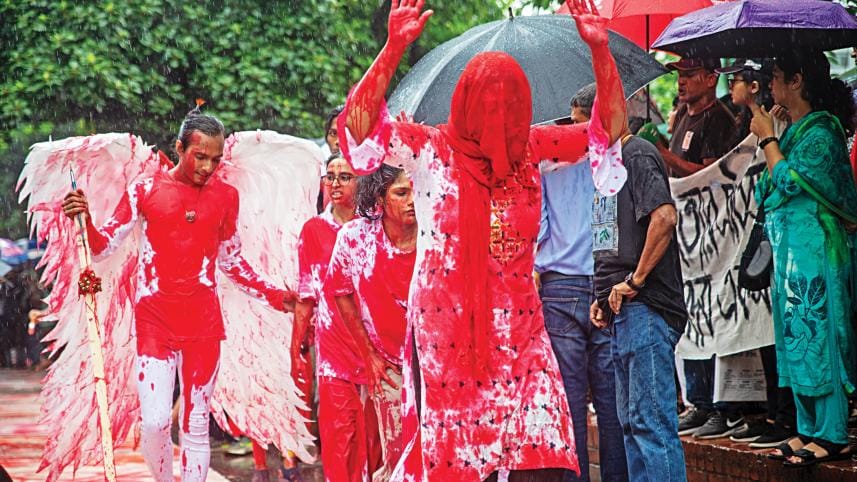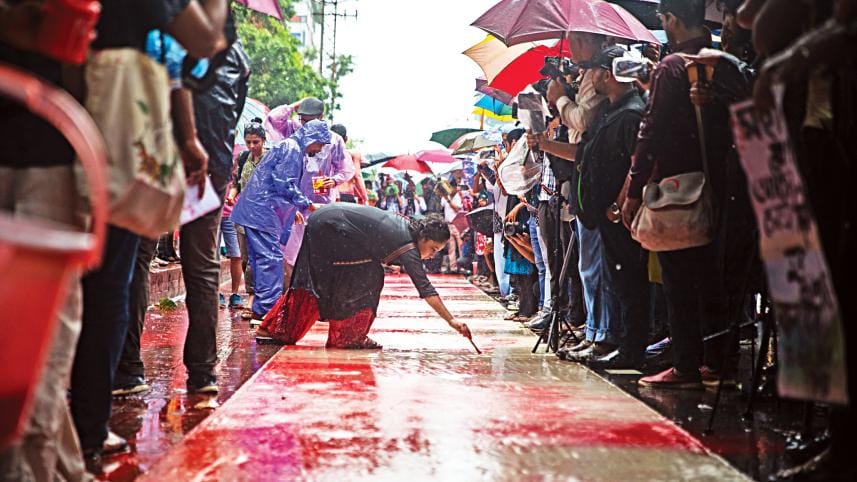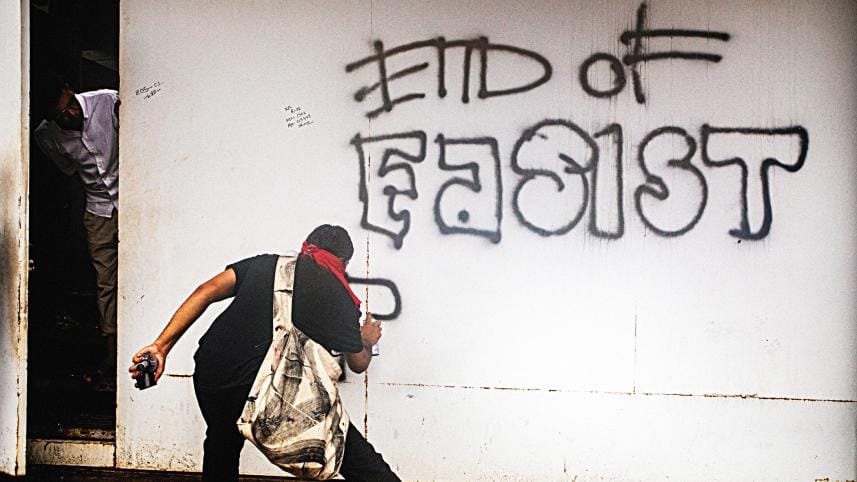Influence of the July uprising on youth activism

There's no denying that July altered the political reality of Bangladesh. The uprising toppled a deeply entrenched despot and unleashed a wave of change that felt as sudden as it was transformative. At the heart of this seismic shift stood the students, their July uprising an evidence of courage and conviction. It is only fitting that these young architects of revolution find themselves shaped by the effects of what is now called the July Revolution. Youth activism in Bangladesh is no stranger to change. From the 1952 Language Movement to the 1971 Liberation War and the 2018 Road Safety Protests, students have often been at the forefront of social change. Yet, before 2024, political apathy among young people seemed to prevail, weighed down by disillusionment and fear of repression.
However, students from diverse political ideologies set aside differences to form alliances like "Students Against Discrimination". The collaboration of traditionally opposed groups—leftists and right-wingers—was unprecedented, upholding a common goal: the dismantling of fascism. This unity set a blueprint for future movements, proving that political divisions could be overcome for a greater cause. After the uprising, youth activism found a new place. The terrain of youth activism saw a significant transformation in the months that followed the uprising. Students began engaging in grassroots movements addressing institutional reforms, empowerment of marginalised groups, gender equality, etc. Public universities saw renewed energy in student unions, while private university students demanded inclusion in national decision-making.
In the quiet fishing community of Mathbaria, Pirojpur, Rubel Mia, a determined young man with a vision, founded the Hate Khori Foundation in 2018. His mission was as straightforward as it was profound: to offer quality education to the children of local fishermen, many of whom had long been denied such opportunities due to financial hardship. When asked about how the July uprising influenced his organisation's goals, Rubel Mia talks about how the unity of the organisation has been bolstered by the July uprising, a moment witnessed by all, reinforcing the belief that far greater achievements can be realised through shared endeavour.

He states, "The July uprising gives us the message that there is no substitute for unity to change or make something successful. It is a great example of how much can be achieved through the collective efforts of everyone. The power or method that has worked behind the goal of my organisation, or the facilitation of social change, is the unity, dedication, and hard work of the members of my organisation."
For him, youth activism and the July uprising are integrally linked, and the combined impact of the two can bring forth significant positive change. Rubel Mia expresses his hopeful desire for his organisation and Bangladesh. He hopes that this momentum will lead to a more harmonious and developed country. Alongside these social and political transformations, the power of unity and collective effort has been underscored, with the uprising serving as a reminder of the change that can be achieved when people come together.

Nuzia Hasin Rasha, President of the Dhaka University (DU) unit of the Revolutionary Student Unity, upon being asked what she thinks of as real change, says, "Real change, as learnt from the lessons of the July mass uprising, involves more than just overthrowing an oppressive regime. It requires addressing the root causes of exploitation, institutionalising democratic governance, and ensuring active participation from all sections of society." She emphasises that true democracy flourishes when every segment of society has a voice and agency in decision-making. This calls for participatory mechanisms that empower students, workers, and marginalised communities, ensuring that governance reflects the collective will.
Youth activism in the Revolutionary Student Unity is committed to building a society anchored in democratic principles and social justice, free from the chains of oppression. Inspired by the fervour of the July uprising, it champions grassroots movements, weaving together the voices of students, workers, and marginalised communities into a unified call for change.

Nuzia speaks about the conviction that true transformation springs from mass participation—through student unions, workers' councils, and community assemblies that embody democratic values in practice. With a focus on political education, the organisation works to illuminate structural inequities, foster cross-group solidarity, and resist the creeping tide of authoritarianism.
A third-year student majoring in health economics at DU, Hema Chakma paints a picture of Bangladesh that is rooted in inclusivity. When speaking about the influence of the July uprising in youth activism, she says, "You and I are society. What society will become depends on what kind of people we are. We must strive to build a society where everyone has the freedom to express themselves, to practice their language, culture, and religion without fear. A society where a Santali person can sing their song just as freely as Rahim's son can. A society where we have the courage to call truth by its name, ensuring that the next generation inherits an environment where this courage is nurtured."
She finds it encouraging that the current wave of seminars, study circles, and roundtable discussions are being organised by various groups. She believes this post-July period is like "a snake shedding its skin"—a time to leave behind old notions and wait for a new dawn, to dream of democracy once more, and to take steps forward again. The similarity between this revolutionary spirit and organisational goals lies in the shared dream of transforming society, a vision that once seemed impossible. She says, "This uprising has united us in building an inclusive society, has taught us the importance of individual activism, and, most importantly, has helped us nurture the belief that change will come."

Volunteering in a non-profit, non-political, and secular voluntary organisation whose primary objective is to promote quality education among underprivileged children, Mashiat Mustaq says firmly, "The uprising has not changed any of our goals and methods for providing quality education to underprivileged children of Bangladesh." Still, she reflects on Hema Chakma's observation: "People are much more vocal now. We have a long way to go to understand how it will serve us." The shifting energy hints at new possibilities for grassroots education efforts in a changing society.
The July uprising has left an indelible mark on youth activism in Bangladesh, rekindling a spirit of collective resistance and reimagining the possibilities of grassroots movements. It has shown that unity, even among diverse political ideologies, can dismantle entrenched systems of oppression. Yet, as the initial fervour wanes, the enduring challenge lies in translating revolutionary energy into sustainable change. Institutional reform, inclusivity, and the empowerment of marginalised voices demand a persistence that outlasts the moment of revolt.
The true test of this generation's activism is whether it can withstand the disillusionments that inevitably accompany the slow grind of systemic change. The July uprising gave the youth of Bangladesh a blueprint for collective action, but the path forward requires balancing idealism with the realities of governance and reform. If they succeed, the uprising will not merely be remembered as a moment of disruption but as the seed of a more inclusive and democratic society.
Azra Humayra is a student of Mass Communication and Journalism at the University of Dhaka.



 For all latest news, follow The Daily Star's Google News channel.
For all latest news, follow The Daily Star's Google News channel.
Comments